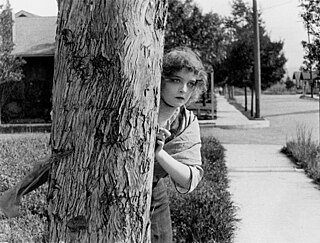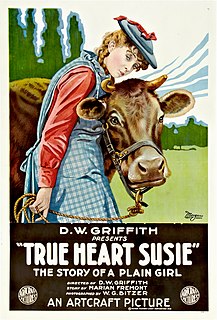Related Research Articles

Lillian Diana Gish was an American actress, director and screenwriter. Her film acting career spanned 75 years, from 1912, in silent film shorts, to 1987. Gish was called "The First Lady of American Cinema", and is credited with pioneering fundamental film performance techniques. In 1999, the American Film Institute ranked Gish as the 17th greatest female movie star of classic Hollywood cinema.

Dorothy Elizabeth Gish was an American actress of the screen and stage, as well as a director and writer. Dorothy and her older sister Lillian Gish were major movie stars of the silent era. Dorothy also had great success on the stage, and was inducted into the American Theater Hall of Fame. Dorothy Gish was noted as a fine comedian, and many of her films were comedies.

War bonds are debt securities issued by a government to finance military operations and other expenditure in times of war. They are also a means to control inflation by removing money from circulation in a stimulated wartime economy. War bonds are either retail bonds marketed directly to the public or wholesale bonds traded on a stock market. Exhortations to buy war bonds are often accompanied by appeals to patriotism and conscience. Retail war bonds, like other retail bonds, tend to have a yield which is below that offered by the market and are often made available in a wide range of denominations to make them affordable for all citizens.

A Liberty bond was a war bond that was sold in the United States to support the Allied cause in World War I. Subscribing to the bonds became a symbol of patriotic duty in the United States and introduced the idea of financial securities to many citizens for the first time.

The Bond is a propaganda film created by Charlie Chaplin at his own expense for the Liberty Loan Committee for theatrical release to help sell U.S. Liberty Bonds during World War I.

Robert Emmett Harron, also known as Bobby Harron, was an American motion picture actor of the early silent film era. Although he acted in over 200 films, he is possibly best recalled for his roles in the D.W. Griffith directed films The Birth of a Nation (1915) and Intolerance (1916).

Hearts of the World is a 1918 American silent World War I propaganda film written, produced and directed by D. W. Griffith. In an effort to change the American public's neutral stance regarding the war, the British government contacted Griffith due to his stature and reputation for dramatic filmmaking.

The New York Hat is a silent short film which was released in 1912, directed by D. W. Griffith from a screenplay by Anita Loos, and starring Mary Pickford, Lionel Barrymore, and Lillian Gish.

Kate Bruce was an American actress of the silent era. She appeared in more than 280 films between 1908 and 1931. She was born in Columbus, Indiana, and died in New York, New York. In 1885, Bruce left Boone, Iowa, in a wagon with a group of traveling actors at a time when stages were illuminated by oil lights. On Broadway, Bruce performed in The Starbucks (1903).

Gold and Glitter is a 1912 American silent drama film co-directed by D. W. Griffith and Frank Powell. Lillian Gish, in the leading female role, was praised for its variety of emotion, in comparison to her previous roles.
La Bohème is a 1926 American silent drama film directed by King Vidor, based on the 1896 opera La Bohème by Giacomo Puccini. Lillian Gish and John Gilbert star in a tragic romance in which a tubercular seamstress sacrifices her life so that her lover, a bohemian playwright, might pen his masterpiece. Gish, at the height of her influence with Metro-Goldwyn-Mayer studios, asserted significant control over the production, determining the story, director, cast, cinematography, and costume design. In February 2020, the film was shown at the 70th Berlin International Film Festival, as part of a retrospective dedicated to King Vidor's career.

George Fawcett was an American stage and film actor of the silent era.
These are the films of Lillian Gish.

The Mothering Heart is a 1913 American short drama film directed by D. W. Griffith. A print of the film survives in the film archive of the Museum of Modern Art.

The Lost House is a lost 1915 American short drama film directed by Christy Cabanne and starring Lillian Gish.

The Greatest Thing in Life is a 1918 American silent drama film about World War I, directed by D. W. Griffith and starring Lillian Gish, Robert Harron, and David Butler. The film is now considered lost as no prints are known to exist.

True Heart Susie is a 1919 American drama film directed by D. W. Griffith and starring Lillian Gish. A print of the film survives in the film archive of the British Film Institute. The film has seen several VHS releases as well as a DVD issue.

Battling Jane is an American silent comedy-drama film released in 1918. It was directed by Elmer Clifton as a vehicle for Dorothy Gish and included some patriotic overtones. According to the Progressive Silent Film List at SilentEra.com, it is not known whether the film currently survives.

The Hun Within is a 1918 American silent war drama thriller film directed by Chester Withey and starring Dorothy Gish and George Fawcett. It was written by historic Biograph directors D. W. Griffith and Stanner E. V. Taylor.
The Little Tease is a 1913 silent black and white film directed by D. W. Griffith, produced by Biograph Company and starring Henry B. Walthall and Mae Marsh.
References
- 1 2 "Progressive Silent Film List: Lillian Gish in a Liberty Loan Appeal". Silent Era. Retrieved June 3, 2009.